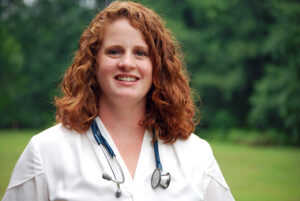Client News: When it Comes to Sexual Trauma, as Health Care Clinicians It’s Our Job to Do No More Harm

I assume my patients have been sexually assaulted.
Building a trusting relationship is key to my work.
MOLLY RIVEST May 5, 2022
I AM A FORMER captain in the US Air Force, where I worked as both a research physicist and as an advocate for sexual assault victims in the military. Today, I am a nurse practitioner in a women’s health care practice caring for women of all ages.
My experience in the military and my work today have instilled a professional imperative: I can assume that the patient in my exam room may have experienced sexual assault. It may have happened yesterday, or decades ago. She may share this past, or I may never know.
 A CDC study tells us that 1 of every 3 female patients and 1 of every 4 male patients have experienced sexual assault in their lifetime. That statistic is likely an understatement, since most incidents are not officially reported. Since many people have trouble speaking up about such abuse, we may not know if a patient is bringing secrecy, shame, or fear into our appointment. So, how can we practice trauma-informed care with every patient we see, knowing that there are things we may not know?
A CDC study tells us that 1 of every 3 female patients and 1 of every 4 male patients have experienced sexual assault in their lifetime. That statistic is likely an understatement, since most incidents are not officially reported. Since many people have trouble speaking up about such abuse, we may not know if a patient is bringing secrecy, shame, or fear into our appointment. So, how can we practice trauma-informed care with every patient we see, knowing that there are things we may not know?
April is Sexual Assault Awareness Month, so it’s a good time to remind ourselves that many people have been victims of some form of sexual assault. Transgendered, gender queer, and non-conforming people are at far higher risk of sexual violence. Minority populations, especially Native American girls, are twice as likely to be sexually assaulted as non-native girls.
Sexual assault has many names: rape, molestation, and sexual trauma, among others. Not all who have experienced sexual assault consider themselves survivors of “trauma.” While trauma is often associated with violence and we know that sexual assault is frequently a confusing experience, perpetrated with subtlety by a known and, or, trusted person. Regardless of the language we or our patients may use, the impacts of sexual assault are physical, psychological, sexual, and spiritual.
The impact of sexual trauma extends to victims’ families and other loved ones, and the residual impacts can burrow into relationships that require trust and intimacy. With the prevalence of sexual assault and its lasting impacts, where do we begin as health care clinicians, if developing a trusting relationship is key to our work?
First, we can safely assume that many of our patients have been sexually mistreated in some manner. Second, we must provide a clinical experience in which physical touch and vulnerable conversations are a collaboration, not just an examination.
Third, we must be aware that our patients may be vulnerable to even our most unintended lapses in consideration: a seemingly benign question or physical contact can cause a patient anxiety, fear, shame, or anger. We may never see that patient again.
It’s up to us to adopt trauma-informed care as our default approach to all patients – because the data and research tell us we can and should. Respecting cultural and ethnic backgrounds, establishing trust and building non-judgmental rapport are our starting points. A patient should feel in charge of their physical and emotional boundaries. Their autonomy should be maintained at all times.
If a patient chooses to share information of a prior assault, as clinicians we should be prepared to meet that individual where they are in their journey. We can offer resources for reporting the assault, or accessing safe housing, or finding appropriate therapy. We should ask this patient if and how they would like the medical exam modified. We should allow time and space for this conversation to take place and a feeling of trust to develop.
Too many patients arrive with memories of abuse, perhaps committed by someone they trusted. Now, it’s we who are doing the caring and asking for trust. If we do it well, we can offer a measure of healing.
Molly Rivest works as a nurse practitioner at CHP Barrington OB-GYN, a practice of Community Health Programs in Great Barrington. If you have been a victim of sexual assault, reach out to someone or call the National Sexual Assault Hotline at 1-800-656-4673.

